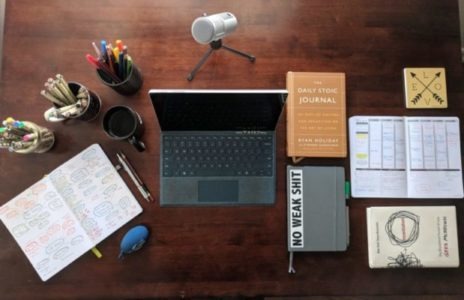A little something different this week as we take a break from our normal format.
I have MANY favorites in a broad range of genres and categories but if I had to break it down to a tight list of five personal and professional reads for a desert island, or space station, or deep-water exploration sub, or…
(in no particular order)
- Turning Pro by Steven Pressfield
“Ambition is the most primal and sacred fundament of our being. Not to act upon that ambition is to turn our backs on ourselves and on the reason for our existence.”
The premise of the book is that the world is divided into two camps of people: Amateurs and Professionals.
Amateurs make up the bulk of society. They bow to resistance at every turn when confronted with challenges on the journey to finding their bliss in life, true meaning and most productive offerings to others. They are fearful, seek external validation from the crowd and do not believe they are deserving of great accomplishments.Professionals are willing to do the hard work – internally and externally – in committing to fight any and resistance daily. They create and sustain habits, they self-validate and see themselves as a hero in the story of their lives. They know that resistance can never be completely overcome but instead a battle each and every day of life, and the professional re-commits to that battle daily.
- Essentialism by Greg McKeown
“If you do not prioritize your life, someone else will. What are you going to do with your one wild and precious life?”
This book is not only a great read for increasing productivity on a tactical level but also in crafting a philosophy for life in all areas regarding choice, control and perspective to the end of living a life of meaning and contentment – your “Essential Intent.”
We all have problems regardless of the degrees of success that are attained. The real question is: What problems do we WANT to have? A core principle of Essentialism is saying ‘no’ but not for the sake of saying no – instead creating filters so you are saying ‘yes’ to the right things – those which can clearly lead to accomplishing your life goals. This means making trade-offs – another core component of this mindset and the one that most folks have problems committing to.
“If you take one thing away from this book, I hope you will remember this: whatever decision or challenge or crossroads you face in your life, simply ask yourself, ‘What is essential?’ Eliminate everything else.“
- Nobody Wants To Read Your Sh*t by Steven Pressfield
“There are only two fundamental principles: 1. Nobody wants to read your sh*t; 2. If you want to write and be recognized, you have to do it yourself.”
This is my favorite book ON writing – the actual process, not just the necessary mindset for success. Filled with tons of examples fro both Steven’s life and fictional case studies it represents everything most important when sitting down to begin writing. Some core principles:
Streamline your message. Focus it and pare it down to its simplest, clearest, easiest-to-understand form.
Make its expression fun. Or sexy, or interesting or scary or informative. Make it so compelling that a person would have to be crazy NOT to read it.
Apply that to all forms of writing or art or commerce. When you begin to understand that nobody wants to read your sh*t you begin to understand that writing/reading is, above all, a transaction. Readers donate time and attention, and the writer must give the reader something worthy of his gift.
- Zen Mind Beginner’s Mind by Shunryu Suzuki
“Zazen (meditation) practice is a direct expression of our true nature.”
I am definitely not super foofy or new age, but I am spiritual and believe that lessons learned about our core emotional and mental selves only serve to empower us in all areas of life including business and legacy.
This is a very accessible book for beginners in meditation and also considered a classic among experts who continue to mine its lessons for decades. And I love the core principle:
“There is no need to have a deep understanding of Zen. You should never say “I know what Zen is,” or “I am enlightened” – that is ridiculous and also the secret of the arts: always be a beginner.“
- Letters To A Young Poet by Rainer Maria Rilke
“Perhaps all the dragons in our lives are princesses who are only waiting to see us act, just once, with beauty and courage. Perhaps everything that frightens us is, in its deepest essence, something helpless that wants our love. Have patience with everything that remains unsolved in your heart….live in the question.”
Over a period of five years the great poet Rilke wrote a series of remarkable responses in letters to a young would-be poet who wrote to him of his problems and hopes. Rilke’s responses provide lessons far beyond writing poetry into areas of life, love, work and surviving as a “sensitive observer in a harsh world.”
I gift this book to all of the students I teach and mentor upon their graduations – MBA, undergraduate and high school. It’s a short book but one that can be read many times and provide valuable guidance on any and all journeys.
As always, follow my Legacy Mentor feed on Instagram for daily quotes, book and product reviews, and knowledge bombs. www.instagram.com/legacymentorofficial
This post originally appeared at www.damondamore.com


Comments are closed.